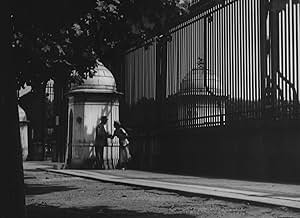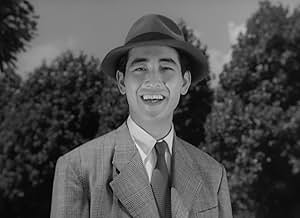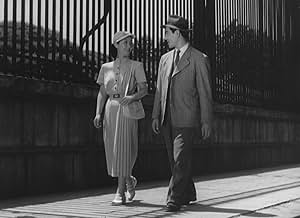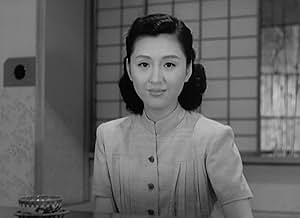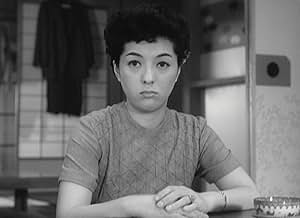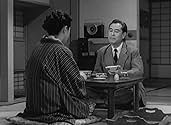VALUTAZIONE IMDb
7,6/10
4129
LA TUA VALUTAZIONE
Una coppia di mezza età senza figli deve affrontare una crisi coniugale.Una coppia di mezza età senza figli deve affrontare una crisi coniugale.Una coppia di mezza età senza figli deve affrontare una crisi coniugale.
- Premi
- 1 vittoria in totale
Recensioni in evidenza
Michiyo Kogure is discontented with her long marriage to Shin Shiburi. She refers to him as "Mr. Obtuse" to her female relations and friends, and talks them into going on holiday with her, claiming to him that her niece, Keiko Tsushima, is at the resort, suffering from appendicitis; she's probably scared and lonely; and then Miss Tsushima walks in. Miss Tsushima is also a problem. Like many an Ozu woman, she doesn't want to get married yet, and certainly doesn't want an arranged marriage like her aunt. It's so primitive.
It all comes to a head one evening when he's enjoying rice with green tea and his wife doesn't like that way of eating it. He tries to explain that he likes simple, primitive, informal things, like cheap cigarettes and third-class railway tickets and pachinko machines. He understands she likes the 'better' things, and that's fine. And he won't pour tea on his rice any more. Her response is to walk out of the room.
I decided most of the way through that this was Ozu's variation on THE TAMING OF THE SHREW, without any of Petruchio's cruelty.... at least on the part of Mr. Shiburi. The studied cruelty is exhibited, in truth by Miss Kogure. There's not a cruel bone in Shiburi's body. He tries to get his niece to do the right thing simply by talking. He's remembered fondly by a member of his old army squadron as kind; he's sponsoring Kôji Tsuruta for a job at his company because he's the brother of an old high-school friend who got killed in the war. Perhaps Kate is a combination of Miss Kogure and Miss Tsushima.
The transformation of Ozu's style from before the war is almost complete. Gone are the American movie posters, although there's some discussion of a Jean Marais film; and the camera sticks pretty close to the floor, although there is one pull-in at the end of a scene, after the players have left. I'm not sure what that is supposed to mean.
It all comes to a head one evening when he's enjoying rice with green tea and his wife doesn't like that way of eating it. He tries to explain that he likes simple, primitive, informal things, like cheap cigarettes and third-class railway tickets and pachinko machines. He understands she likes the 'better' things, and that's fine. And he won't pour tea on his rice any more. Her response is to walk out of the room.
I decided most of the way through that this was Ozu's variation on THE TAMING OF THE SHREW, without any of Petruchio's cruelty.... at least on the part of Mr. Shiburi. The studied cruelty is exhibited, in truth by Miss Kogure. There's not a cruel bone in Shiburi's body. He tries to get his niece to do the right thing simply by talking. He's remembered fondly by a member of his old army squadron as kind; he's sponsoring Kôji Tsuruta for a job at his company because he's the brother of an old high-school friend who got killed in the war. Perhaps Kate is a combination of Miss Kogure and Miss Tsushima.
The transformation of Ozu's style from before the war is almost complete. Gone are the American movie posters, although there's some discussion of a Jean Marais film; and the camera sticks pretty close to the floor, although there is one pull-in at the end of a scene, after the players have left. I'm not sure what that is supposed to mean.
Its about a rich family and arranged marriages. Taeko is in an arranged marriage which is not so successful, they communicate very badly and she lies to get out and do fun things with her friends. For her it is easy to lie to the husband as she thinks he is very stupid. Her niece don't want to go on a arranged marriage meet, but decide for herself who she wants to marry probably a sign of the times, the transition from traditional to modern Japan. In other ways also the modern is juxtaposed with the traditional, they wear kimonos as naturally as western style clothes. And her sister is working in a top position as a designer.
As another IMDb reviewer said this is most interesting because of the charming characters. The elegant, but a bit arrogant and selfish Satake Taeko (Kogure Michiyô) had me spellbound from beginning to end. All characters are interesting and the interaction and communication between them make up the movie.
The city itself takes up a small role in the movie as well, something I like a lot. Editing also is very clever at times. Its never ordinary or dull.
As another IMDb reviewer said this is most interesting because of the charming characters. The elegant, but a bit arrogant and selfish Satake Taeko (Kogure Michiyô) had me spellbound from beginning to end. All characters are interesting and the interaction and communication between them make up the movie.
The city itself takes up a small role in the movie as well, something I like a lot. Editing also is very clever at times. Its never ordinary or dull.
Ozu marriage stories are one of the best ones. He really hits you with his deep and truthful dialogues. I loved the cinematography and the use of shadows. Also, I got hungry watching this.
"The flavour of green tea over rice" is both a typical Ozu movie and one that defiates from his usual format in some respects.
Typical Ozu is the emphasis on small- and not on big emotions. The story is, as usual. Situated in the post World War II era, and the influence of the United States on the Japanese society is clearly visiblle (baseball match).
In most of the Ozu films the central relations are between children and parents (at the beginning of his career) or between parents and grandparents (later in his career). In "The flavour of green tea over rice" it is a married couple that forms the center of the film. Their marriage was arranged and is not in good shape. You can feel it when the man returns home from his work and the greeting of the two spouses is lukewarm at best.
The woman seems independent and emancipated at first. She has her female friends and she likes going out with them. As the film progresses she becomes however less and less sympathetic. In front of her female friends she expresses herself very disrespectfully about her husband (a dummy), whom we get to know as a person of great integrity. She happens to be of richer descent than her husband and dislikes his "cheap taste" (maybe being a snob herself).
Although differences between genarations do play a lesser role than in most Ozu films, they aren't totally non existent either. Seeing the marriage between her uncle and aunt, a niece of the woman in a subplot vehemtly resists becoming trapped in an arranged marriage herself.
In one of the most beautiful happy ends I have ever seen the two spouses reconcile with each other. When the man arrives at home in the middle of the night from the airport the servants are already in bed. Man and woman together prepare a meal, in so doing discovering how their kitchen works (normally the woman never cooks herself). The act of preparing a meal is capable to bridge the gap that hitherto existed between man and woman, just like the act of eating a (delicious) meal is capable of bridiging tge gap between Protestants and Roman Catholics in "Babette's feast" (1987, Gabriel Axel). The meal in "The flavour of green tea over rice" is however very simple compared with "Babette's feast". It's not the food itself that does the trick, it is all about the small talk during the preparation. Ozu as the master of the small emotions at his very best.
Typical Ozu is the emphasis on small- and not on big emotions. The story is, as usual. Situated in the post World War II era, and the influence of the United States on the Japanese society is clearly visiblle (baseball match).
In most of the Ozu films the central relations are between children and parents (at the beginning of his career) or between parents and grandparents (later in his career). In "The flavour of green tea over rice" it is a married couple that forms the center of the film. Their marriage was arranged and is not in good shape. You can feel it when the man returns home from his work and the greeting of the two spouses is lukewarm at best.
The woman seems independent and emancipated at first. She has her female friends and she likes going out with them. As the film progresses she becomes however less and less sympathetic. In front of her female friends she expresses herself very disrespectfully about her husband (a dummy), whom we get to know as a person of great integrity. She happens to be of richer descent than her husband and dislikes his "cheap taste" (maybe being a snob herself).
Although differences between genarations do play a lesser role than in most Ozu films, they aren't totally non existent either. Seeing the marriage between her uncle and aunt, a niece of the woman in a subplot vehemtly resists becoming trapped in an arranged marriage herself.
In one of the most beautiful happy ends I have ever seen the two spouses reconcile with each other. When the man arrives at home in the middle of the night from the airport the servants are already in bed. Man and woman together prepare a meal, in so doing discovering how their kitchen works (normally the woman never cooks herself). The act of preparing a meal is capable to bridge the gap that hitherto existed between man and woman, just like the act of eating a (delicious) meal is capable of bridiging tge gap between Protestants and Roman Catholics in "Babette's feast" (1987, Gabriel Axel). The meal in "The flavour of green tea over rice" is however very simple compared with "Babette's feast". It's not the food itself that does the trick, it is all about the small talk during the preparation. Ozu as the master of the small emotions at his very best.
This film mines much of the territory of Ozu films, including the complex relationships of the major characters, the resistance of a young lady to agree to an arranged marriage and the aesthetics of everyday living amongst the working classes. The film has two main stories, parallel to each other, running through it: Takeo, who is bored with her husband who is very simple in his needs, lies to him so she can go to a spa with her friends. Their niece, the pretty Setsuko, is the one who is resisting the arranged marriage meeting. How the two stories bisect is typical Ozu, creating conflict and anger. This film is not as good as much of Ozu's output at the time, but that includes "Tokyo Story", "Early Summer" and "Late Spring", which are standout classics. The great Setsuko Hara is not in this film and the equally great Chishu Ryu is a bit player, but I think you'll still find this film worthy of your time. If you haven't seen an Ozu film, start with "Tokyo Story" or "Late Spring" (others too, including "Good Morning" and "Autumn Afternoon") but give this a try. I don't think you will be disappointed.
Lo sapevi?
- QuizAt the start of the film, two characters mention going to see a new film with Jean Marais. The film was most likely Orfeo (1950), which was released in Japan in June 1951.
- Citazioni
Taeko Satake: Think well before you pick your groom, it's important.
- ConnessioniFeatured in David Bordwell on 'The Flavor of Green Tea Over Rice' (2019)
- Colonne sonoreLove's Old Sweet Song
Composed by J.L. Molloy (as James Lyman Molloy)
I più visti
Accedi per valutare e creare un elenco di titoli salvati per ottenere consigli personalizzati
- How long is The Flavor of Green Tea Over Rice?Powered by Alexa
Dettagli
- Data di uscita
- Paese di origine
- Lingua
- Celebre anche come
- The Flavor of Green Tea Over Rice
- Luoghi delle riprese
- Azienda produttrice
- Vedi altri crediti dell’azienda su IMDbPro
- Tempo di esecuzione
- 1h 56min(116 min)
- Colore
- Mix di suoni
- Proporzioni
- 1.37 : 1
Contribuisci a questa pagina
Suggerisci una modifica o aggiungi i contenuti mancanti


